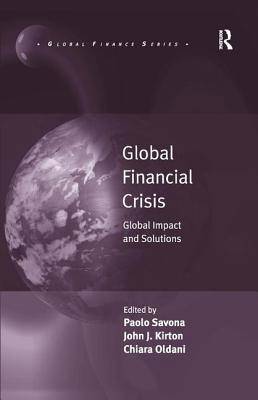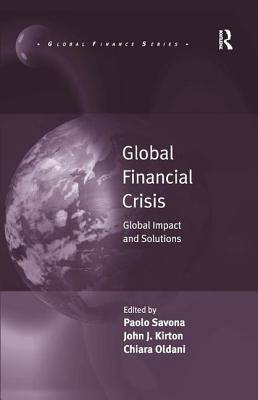
- Afhalen na 1 uur in een winkel met voorraad
- Gratis thuislevering in België vanaf € 30
- Ruim aanbod met 7 miljoen producten
- Afhalen na 1 uur in een winkel met voorraad
- Gratis thuislevering in België vanaf € 30
- Ruim aanbod met 7 miljoen producten
Zoeken
€ 274,95
+ 549 punten
Omschrijving
Out of the debate over the effectiveness of the policy responses to the 2008 global financial crisis as well as over the innovativeness of global governance comes this collection by leading academics and practitioners who explore the dynamics of economic crisis and impact. Edited by Paolo Savona, John J. Kirton, and Chiara Oldani Global Financial Crisis: Global Impact and Solutions examines the nature of the recent crisis, its consequences in major regions and countries, the innovations in the ideas, instruments and institutions that constitute national and regional policy responses, building on the G8's response at its L'Aquila Summit. Experts from Africa, North America, Asia and Europe examine the implications of those responses for international cooperation, coordination and institutional change in global economic governance, and identify ways to reform and even replace the architecture created in the mid 20th century in order to meet the global challenges of the 21st.
Specificaties
Betrokkenen
- Auteur(s):
- Uitgeverij:
Inhoud
- Aantal bladzijden:
- 348
- Taal:
- Engels
- Reeks:
Eigenschappen
- Productcode (EAN):
- 9781409402718
- Verschijningsdatum:
- 28/05/2011
- Uitvoering:
- Hardcover
- Formaat:
- Genaaid
- Afmetingen:
- 156 mm x 234 mm
- Gewicht:
- 666 g

Alleen bij Standaard Boekhandel
+ 549 punten op je klantenkaart van Standaard Boekhandel
Beoordelingen
We publiceren alleen reviews die voldoen aan de voorwaarden voor reviews. Bekijk onze voorwaarden voor reviews.











